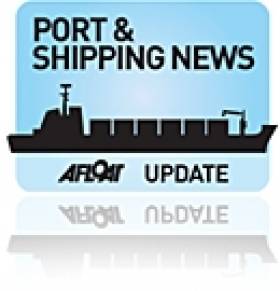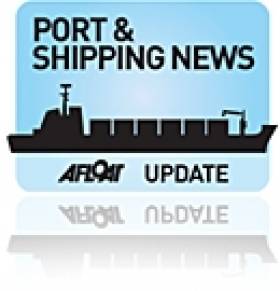Displaying items by tag: Lysblink Seaways
Final Scottish Journey for Stricken Paper-Products Cargoship
#CargoshipsEnd - Lysblink Seaways, the paper-products cargsoship, which ran aground off the Scottish west coast in February, is according to InverClydeNow.com to be broken up on the Clyde after damage proved too extensive to repair.
The side-loading carrier vessel was originally towed to Greenock following the incident near Ardnamurchan Point and has been in Inchgreen Drydock as previously reported on Afloat.ie for more than a month for inspected.
But yesterday she was towed across the river to DRB Marine Services at Rosneath. They have confirmed that they have been awarded the job of taking the ship apart for recycling.
The 394ft-long (120-metre) Lysblink Seaways was carrying paper from Belfast to Norway when she got into difficulty at Kilchoan in the early hours of Wednesday 18 February.
The ship, which was built in 2000 and lengthened in 2004, had called at Greenock Ocean Terminal just three days before the accident.
Kasper Moos, vice president of technical organisation at the ship's owners DFDS Group, confirmed that the hull damage is too extensive for the ship to be repaired. "Therefore, it has been decided to recycle the vessel," he said.
To view photographs from the news report which shows the vessel after the incident been assisted by tugs on the Clyde, click here.
Grounded Cargo Ship Moved To Safer Anchorage
#Shipping - Stricken cargo ship the Lysblink Seaways was set to be moved to a safe haven yesterday afternoon (25 February) in advance of poor weather.
As previously reported on Afloat.ie, the 120m-long vessel ran around near Ardnamuchan Point in Scotland's West Highlands a week ago while en route from Belfast to Norway.
The ship later refloated in high tide a day after her hull was lifted onto the rocky shore near Kilchoan.
Divers began inspections for damage as the Lysblink Seaways dropped anchor near the grounding spot in Mingary Bay.
But according to Practical Boat Owner, severe weather forecast for the next few days prompted quick action to pump out more than 150 tonnes of fuel from the ship.
She was then scheduled to be towed to a safe anchorage at Scallastle Bay in the Sound of Mull, some 17 miles away.
Practical Boat Owner has more on the story HERE.






























































